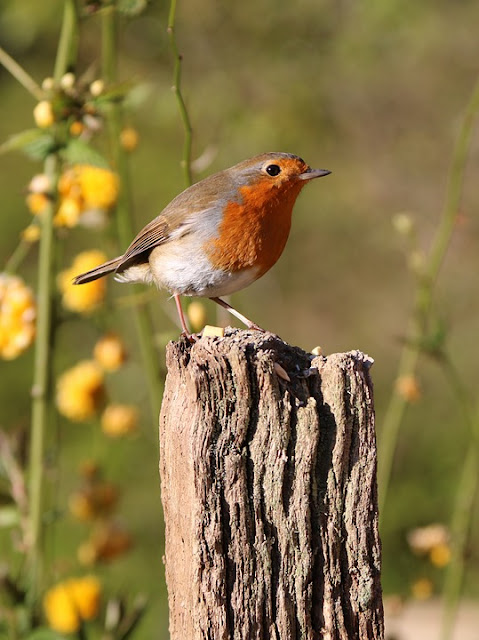Britain is well known as a nation of wildlife lovers and in gardens large and small up and down these Isles birds and animals happily share the green spaces around our homes. The European Robin is probably Britain's most favourite bird. In the 1960's in a vote published in The Times of London the robin was voted the UK's unofficial national bird and in 2015, the robin was again voted Britain's national bird in a poll organised by birdwatcher David Lindo.
An old English folk tale seeks to explain the robin's distinctive breast. Legend has it that when Jesus was dying on the cross, the robin, then simply brown in colour, flew to his side and sang into his ear in order to comfort him in his pain. The blood from his wounds stained the robin's breast, and thereafter all robins got the mark of Christ's blood upon them.
Robins are unmistakable with their bold red chests which are the same for both male and female birds. They are very territorial and will defend their patch aggressively. Flashing its red breast and singing from the highest tree is sometimes enough, but all to often intruders are met by combat. This is especially so in the breeding season.
Junior birds have a golden brown speckled chest which prevents adults seeing them as a threat to their territory (as picture above) Mature birds will only defend their territories against other robins. All other birds it seems can come and go in the patch without hindrance.
Robins like to nest fairly near the ground and can often be found in all manner of unusual locations. A flower pot lying on its side, a pile of logs, old tins and tree stumps are among many things that robins will nest in. Robins usually have several broods in a season.
If you want to encourage Robins to nest in your garden you could try putting up a nest box which needs to be open fronted rather than having a small hole. Place the box around a metre from the ground (higher if there are a lot of cats around) and hide it amongst dense Ivy, or wisteria or similar climber against a wall or trellis. Do not be tempted to take a peak during the building of nests and laying and hatching of eggs. Robins have been known to abandon sites if there is to much human activity. Robins start looking for a suitable mate as early as January, but breeding usually starts in earnest around March here in the UK.
Robins eat a wide variety of insects, spiders, beetles and worms. During the winter months when food is scarce they will supplement their diet with berries and remaining fruits from the hedgerows.
They will readily visit a bird table to eat seed mixtures especially during cold and frosty weather.
Mealworms are a real favourite of robins, so much so that given a little time for them to get used to you putting them out on the bird table they will begin to take them from an outstretched hand.
Robins are wonderful singers and are amongst the first to join in the dawn chorus to herald a new day. It is not unusual to hear robins sing at night especially in suburban areas where the streets are artificially lit.
Robins are seldom shy when humans are around especially if you are turning over a vegetable patch or weeding. Most gardeners will be familiar with a robin waiting patiently in a nearby tree or even perched on the wheelbarrow ready to swoop down when your work uncovers a worm or beetle.
Most British robins stay within the UK and defend their territories all year round but a few migrate south in winter to the European Continent. The robin has become strongly associated with Christmas, taking a starring role on many Christmas cards since the mid 19th century and has appeared on many Christmas postage stamps. The association with Christmas more probably arises from the fact that postmen in Victorian Britain wore red jackets and were nicknamed "Robins"; the robin featured on the Christmas card is an emblem of the postman delivering the card.
General discussion and your views are welcome please say hello. I regret however because of my busy schedule, I am unable to answer many questions. Sneaky advertising will be deleted sorry. Thanks so much for visiting my blog today.
Most British robins stay within the UK and defend their territories all year round but a few migrate south in winter to the European Continent. The robin has become strongly associated with Christmas, taking a starring role on many Christmas cards since the mid 19th century and has appeared on many Christmas postage stamps. The association with Christmas more probably arises from the fact that postmen in Victorian Britain wore red jackets and were nicknamed "Robins"; the robin featured on the Christmas card is an emblem of the postman delivering the card.
General discussion and your views are welcome please say hello. I regret however because of my busy schedule, I am unable to answer many questions. Sneaky advertising will be deleted sorry. Thanks so much for visiting my blog today.












No comments:
Post a Comment